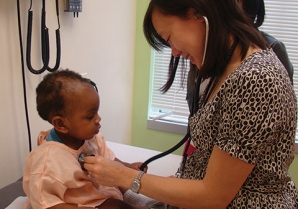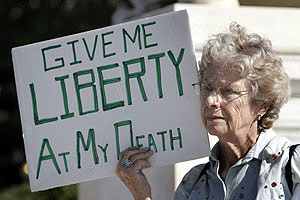Overview
 In a pluralistic society valuing religious and moral freedom, health care should not be dictated or compromised by personal, sectarian religious beliefs. Allowing adults┬áto make their┬áown┬ápersonal choices, where they do not affect others, is the basis of liberty, and this applies to health as well. Our laws should be informed by the science and practice of modern medicine, which having saved billions of lives and extended lifespans is humanity’s greatest achievement, deserving respect and attention.
In a pluralistic society valuing religious and moral freedom, health care should not be dictated or compromised by personal, sectarian religious beliefs. Allowing adults┬áto make their┬áown┬ápersonal choices, where they do not affect others, is the basis of liberty, and this applies to health as well. Our laws should be informed by the science and practice of modern medicine, which having saved billions of lives and extended lifespans is humanity’s greatest achievement, deserving respect and attention.
Our Recommendations on Health and Safety
SECULAR RECOMMENDATIONS ON RECOVERY PROGRAMS
Alcoholics Anonymous (AA) has been providing alcohol recovery services for eighty-plus years and has long been the recommended solution for individuals with an alcohol-dependency problem. AA originally sprang from a Christian religious movement called ÔÇ£The Oxford Group,ÔÇØ and AA (and programs based on its model) use ÔÇ£higher powerÔÇØ imagery in its 12-step program model that can be alienating for nontheists and negatively impact their recovery. In fact, court-ordered AA is a violation of the Establishment Principle. AA has benefitted many individuals, providing recovery programs vital [...]
SECULAR RECOMMENDATIONS ON CHILDRENÔÇÖS HEALTH ISSUES
Religiously Based Child Abuse and Neglect The U.S. Supreme Court has made it clear that the right to practice oneÔÇÖs faith does not extend to the point where childrenÔÇÖs health and safety are jeopardized. The Court ruled in Prince v. Massachusetts that parentsÔÇÖ religious beliefs do not give them a constitutional right to engage in practices that compromise a childÔÇÖs health or safety. In his article, ÔÇ£The Children We Abandon,ÔÇØ William & Mary Law School Professor James G. Dwyer states that child abuse laws providing [...]
SECULAR RECOMMENDATIONS ON RESEARCH ISSUES
The use of stem cell and fetal tissue for contemporary medical research is a complicated moral issue. The decision as to whether or not to allocate federal funds to stem cell research should not be dictated by religious beliefs. Human pluripotent stem cells, more commonly known as ÔÇ£stem cells,ÔÇØ are derived through two different methods. One method uses early stage embryos in excess of clinical need and donated by women undergoing in vitro fertilization. The other method isolates stem cells from aborted fetuses. Stem cells [...]
SECULAR RECOMMENDATIONS ON WOMENÔÇÖS HEALTH ISSUES
Introduction There are complicated moral and ethical questions involved in womenÔÇÖs health issues and access to health care for theists and nontheists alike. However, the particular influence of sectarian religious belief on government policy regarding women suggests a government endorsement of particular religious beliefs to the exclusion of minority and non-theist views. ABORTION BANS In the landmark case Roe v. Wade, the U.S. Supreme Court recognized that the U.S. Constitution protects a womanÔÇÖs right to make her own medical decisions, including her decision to have [...]
SECULAR RECOMMENDATIONS ON RIGHT TO DIE
The Right to Die movement, launched in 1976, has its foundation in two court decisions. In re Quinlan, the New Jersey Supreme Court ruled unanimously to appoint Karen Ann QuinlanÔÇÖs father her legal guardian with the authority to make medical decisions on her behalf, including the removal of life-sustaining treatment. With this decision, competent persons or their legal guardians obtained the legal right to refuse medical treatment. Ten years later, in Cruzan v. Director, Missouri Dept. of Health, the U.S. Supreme Court clarified that a [...]





